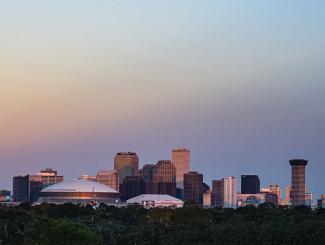In the span of Tulane’s nearly 200-year history, a decade seems like the blink of an eye — but what a decade it’s been. It is truly an honor to lead this institution at a time when our distinctive academic and research strengths, coupled with our unique history and culture, are making an impact like never before as we lay the groundwork for a transformative future.
Many of us vividly remember a time when Tulane’s future seemed less than certain. I was dean of the law school at the University of Pennsylvania in August 2005, when Hurricane Katrina and the subsequent levee failures devastated the city of New Orleans and forced Tulane to close for the fall semester. Penn Law hosted many Tulane law students tuition-free during the semester that Tulane was closed so they could continue their studies. In the months and years that followed, I watched as Tulane made a remarkable recovery, never imagining that I might find myself leading that same remarkable institution.































































